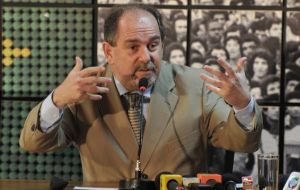MercoPress. South Atlantic News Agency
Austerity measures to balance the budget, if Dilma is Brazil’s next president
 Jose Eduardo Dutra also anticipates greater government involvement in mining and oil industries
Jose Eduardo Dutra also anticipates greater government involvement in mining and oil industries Brazil's ruling coalition candidate could adopt austerity measures to balance public accounts if elected president in October and also favours a heavier state hand in the oil and mining industries, her party chief told reporters.
According to the latest opinion polls former cabinet chief Dilma Rousseff has taken a large lead over her main rival, former Sao Paulo state governor Jose Serra from the centrist PSDB party. Many analysts say she could win an absolute majority on October 3, giving her a strong mandate for budget cuts some analysts see as inevitable next year.
“Fiscal discipline is not electoral propaganda. It's a principle that will be maintained” said Jose Eduardo Dutra, head of Rousseff's Workers' Party adding that “If necessary Dilma would cut spending to meet budget targets”.
Fiscal discipline under President Lula da Silva has slacked off ahead of the election, with the 12-month primary budget surplus falling to 2.07% of GDP in June. That is well below the primary budget surplus target of 3.3 percent of GDP, which Rousseff intends to maintain.
“The Lula da Silva government did it in its first year and the Dilma government will also do it,” Dutra said in reference to austerity measures adopted early in Lula da Silva's first term.
Dutra's statements underscore what looks to be a two-pronged economic policy under Rousseff -- continuation of market-friendly macroeconomic policies but more government intervention in select industries.
Dutra did not rule out that Rousseff's government could tax mineral exports as a way to provide incentives for value-added manufacturing industries. But he insisted this would only occur in consultation with industry and not by decree.
“There are cases in which taxation can have positive effects and cases where it doesn't,” Dutra said, without detailing what minerals he referred to.
However as Lula da Silva’s former chief of staff and energy minister, Ms Rousseff also played a key role in drafting legislation to increase government control in the oil industry.
If she were to win, Rousseff would also push the state-owned oil company Petrobras to fulfil more of its procurement contracts locally.
“The policy of this government -- and it will be that of the next -- is that everything possible will be made in Brazil” Dutra said in reference to Petrobras procurement. But in some cases, where there is insufficient local industrial competition or capacity, there needs to be flexibility, he said.




Top Comments
Disclaimer & comment rules-

-

-

Read all commentsAusterity! Budget cuts! da Silva slacked off to make himself popular. Hard times ahead!
Aug 21st, 2010 - 02:03 pm 0Not no much. The government only had a smaller surplus than it was used to (2 vs 3%). There was no deficit.
Aug 21st, 2010 - 03:14 pm 0I think that harrier is talking about britain; brazil is ok; I will be in brazil in 2011 with my girls, in avenida 9 de julho sp.
Aug 21st, 2010 - 07:11 pm 0brazil will spend those cuts in those subs; 3 is the best number.
Commenting for this story is now closed.
If you have a Facebook account, become a fan and comment on our Facebook Page!